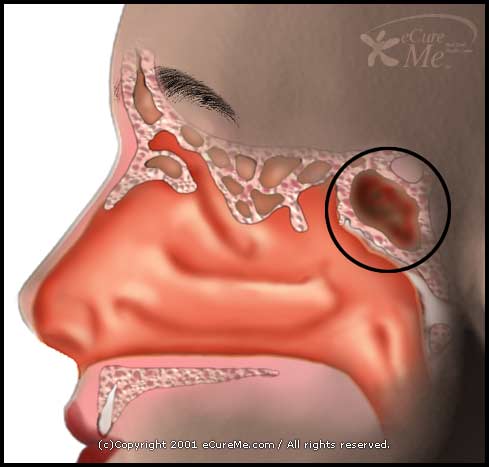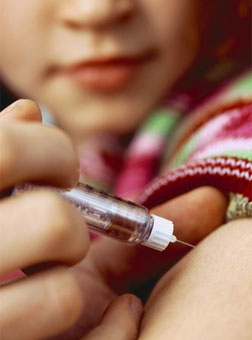
If you felt bad or congested, waking with a headache, and a notice swelling around the eyes, it is possible that the sinusitis. Sinusitis can be uncomfortable and even painful at times, but usually not serious.
What is sinusitis?
Sinusitis is the medical term for inflammation (irritation and swelling) of the sinuses. It is usually caused by infection.
The sinuses are moist air spaces in the bones of the face near the nose. The frontal sinuses are in the area near the eyebrows, the maxillary sinuses are located inside the cheekbones, Åre ethmoid sinuses between the eyes and the sphenoid sinuses sit behind the ethmoid sinuses.
When we are healthy, our sinuses are filled with air, making our facial bones less dense and much lighter in weight. Sinuses also play a role in how our voices sound.
Infection by viruses or bacteria - or a combination of both - sinusitis can cause. Normally, someone with a cold also has inflammation of the sinuses. This is viral sinusitis. Allergies can also lead a person to develop sinusitis.
When nasal congestion (weight) associated with the common cold or allergies does not allow the sinuses to drain properly, bacteria can become trapped inside the sinuses, leading to bacterial sinusitis.
Bacterial sinusitis tends to make a sick person the impression that the viral sinusitis. Someone with bacterial sinusitis usually will have more pain and swelling of the face of someone with viral sinusitis, and can also develop a fever.
The signs and symptoms of sinusitis
Some of the signs that someone may have bacterial sinusitis are:
* A stuffy or runny nose with a cough lasting 10 days to 14 days or more without improvement
* Discharge of mucus from the nose (which can produce both viral and bacterial, but the discharge continued thick sinusitis is more likely that bacterial sinusitis)
* The persistence of pain or swelling around the eyes
* Tenderness or pain in or around the cheekbones
* A feeling of pressure in the head
* A headache when you wake up in the morning or at the address above
* Bad breath even after brushing teeth
* Pain in the upper teeth
* A fever over 102 degrees Fahrenheit (39 Celsius)
Some people also have dry cough and difficulty sleeping. Others were nausea or upset stomach.
Although several of these symptoms are similar to those available from the virus or allergic rhinitis, sinusitis (inflammation of the nose and sinuses due to allergy), it's a good idea to see your doctor if. Viral sinusitis and allergic rhinitis are more common, but often bacterial sinusitis should be treated with antibiotics, and can not get these with a doctor's prescription.
How is it treated?
If your doctor prescribes antibiotics for bacterial sinusitis, you may need to take up to 3 weeks. Your doctor will also prescribe a decongestant in May to all forms of sinusitis. If your sinusitis is the result of allergies, your doctor may recommend that you take an antihistamine every day too.
Can I prevent sinusitis?
You can reduce your risk of getting sinusitis by making some simple changes in their environment. Try using a humidifier during stop cold dry air from irritating your sinuses, which may render them more vulnerable to infection. Clean the humidifier regularly because mold, which can trigger allergies in some people, forms easily in moist environments.
If you have allergies, make an extra effort to control them, because they can make a person more vulnerable to developing a sinus infection.
Although sinusitis is not contagious, which in turn, is often preceded by a cold, which may extend to family members and friends. The most effective way to prevent the spread of germs is to wash hands frequently and thoroughly. Avoid scarves, and try to stay out of the line of fire when someone sneezes.
What can I do to feel better?
If your doctor has prescribed antibiotics or other medications, be sure to follow the instructions carefully. Sinusitis can be difficult to remove and can return if it is not the first time. Even if you feel better, it is important to continue taking antibiotics until the completion of their course prescribed by your doctor. This helps to kill all the bacteria causing the infection.
Get plenty of rest and fluids to the body's immune system can work with antibiotics to fight infection.
Taking ibuprofen or acetaminophen can help relieve pain and inflammation. A cold mist humidifier to relieve your sinuses May. Warm compresses usually help with facial pain. Some doctors suggest saline (salt base) non-prescription nose drops to keep nasal passages moist.
The most important thing to remember about sinusitis, although the odds are of the type that is not serious, it is always important to consult a doctor. Doing so in turn has a bacterial infection, treatment can help prevent the spread of infection or ill, and help you more quickly.




